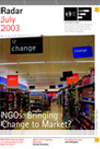 Elsie Maio In Response
Elsie Maio In Response
Radar (a publication of SustainAbility Ltd.)
2003, USA
I read the recent branding edition of Radar with interest. For me, one of the main distinctions between the practice of branding in the UK and Europe compared with the US is about the evolution of the whole agenda. Organizations in the EU have lead the way with visible initiatives about their corporate responsibility. In contrast, US companies often appear reluctant to commit to anything beyond cause related marketing, or to responsible actions couched as ‘enlightened self interest’.
At the same time, U.S. brands may well be poised to jump that ‘responsibility’ S-curve and leap right into values-driven corporate branding. After all, values, not rules or norms, are better predictors of consistent ‘right behaviour’. And the scandal-ridden U.S. business community bears a heavy onus to prove its respectable intentions. But these differences are less interesting to me, on balance, than the common factors driving the corporate agenda today.
The empowered stakeholder is one common driver. They hold explosive implications for the future of organizations and all their decision making processes. The rise of the stakeholder has critical implications for branding, too. The corporate brand is a multi-stakeholder product now, enriched by its activist partners, just as it is held and shaped by their close scrutiny. The CEO steward of this ‘shared’ asset tends to do eight things to keep it healthy - no matter what continent he calls home:
1. Take a real stand for matching the talk with the walk
The antidote to scepticism and discontent with corporate behaviour is authentic corporate responsibility and accountability. So the CEO is accountable for the corporation walking the talk that the marketing and communications disciplines historically craft and then promote.
2. Take the long, strategic view Short term planning cycles are not consonant with sustainable corporate behaviour.
So too, brand management practices become more connected to the longer term strategic initiatives of the corporation and the evolving preferences of its stakeholders.
3. Sensitise over, under, sideways, down
If a corporation is truly to embrace the objectives of corporate responsibility and its next phases, it will become a more careful listener to a much broader group of constituents.
4. Build social value(s)
As the bar rises on membership in the community of trusted corporations, companies demonstrate a new set of attributes in a more deliberate manner. They include attributes and values that are ‘humane’ or what we refer to as ‘soulful’.
5. Dance with more of the people, more of the time
The notion of inclusiveness as a strategic advantage is at the heart of stakeholder engagement practices. It is not too surprising that creativity, and agreement, should multiply among a diverse group of people who sit down together to discuss their common interests and concerns.
6. “Kill the Buddha”
A spiritual teacher once told a story that demonstrated the need to set aside the ‘experts’ and trust one’s self. An implication of the ‘responsibility’ movement is that the corporate brand manager becomes more of a facilitator, an orchestra leader, rather than a sage or expert.
7. Know and heal, thyself
The New Brand Management can help you build an authentic, values-driven culture. Here, the primary role of the brand is to establish the standards for behaviour: not in rules and regulations, but in the spirit that drives ethical decision making throughout the organisation. The very processes, and ‘plumbing’, of managing the brand provide a perfect opportunity for the corporation to monitor and help nurture those same values.
8. The brand is porous: manage osmosis
The shift in power from corporation to stakeholder has come with a thud, accelerated by ecommerce and Internet activism. Historically brand managers were content to sample audiences periodically, remotely, if you will; now we must participate with them interactively, collaboratively, almost continually.
Elsie Maio has guided leaders in the Fortune 100 for twenty years to achieve specific business goals by managing their brands strategically. Her firm, Maio and Company, Inc., pioneers the field of values based brand strategy with a global methodology called SoulBrandingSM.
+ Download article (PDF file l 143K)


